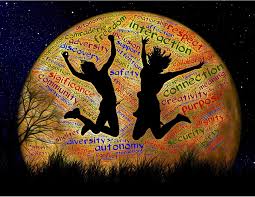A single question in the vast fabric of existence has captured people's attention throughout all eras and civilizations:
what is the purpose of life?
This deep question has provoked the minds of philosophers, theologians, scientists, and common people in equal measure, leading to a variety of interpretations and incessant discussions.We find ourselves constantly driven to the search for meaning and purpose in life as we make our way through its complexity.
The search for meaning shapes the essence of our identity and how we see the world, cutting across barriers of philosophy, religion, and culture.Even while there may not be a single, conclusive response to this existential question, considering many angles helps to highlight how complex and multifaceted this important question is.

The question of what the meaning of life is has been debated by numerous philosophical traditions
.Existentialists such as Jean-
Paul Sartre argued that there is no fundamental meaning to existence and that people have to make their own meaning by their decisions and deeds.According to this viewpoint, people have a great deal of responsibility to create their own lives and break free from social norms and preconceived notions.
On the other hand,
religious and spiritual beliefs frequently suggest that there is a divine design or greater purpose that underlies the meaning of life.For some, it means seeking spiritual enlightenment or salvation, adhering to moral standards, and aligning oneself with religious teachings.In this context, seeking a meaningful life frequently entails commitment, service, and observance of particular beliefs or customs.
In addition,
psychological viewpoints add to the conversation about the purpose of life.Prominent psychiatrist and Holocaust survivor Viktor Frankl developed logotherapy, emphasizing the significance of giving one's suffering meaning.He suggested that even in the most difficult circumstances, people may find meaning in their interactions with others, their life experiences, and their contributions to the larger good.In addition, cultural factors have a big impact on how we interpret the purpose of life.
Diverse values,
including those related to family ties, community cohesion, personal fulfillment, and advancement of society, may be given priority in different civilizations and traditions.These cultural quirks highlight how subjective the search for meaning is, with each person's perception blending into larger cultural contexts.
From a scientific standpoint,
questions about the origins and evolution of life are raised by the quest for meaning. Evolutionary biology holds that life organically developed over billions of years to reach its current state of complexity and diversity But while if science sheds light on how life functions, it does not directly answer the existential question of what the meaning or purpose of being is.

Introspective moments in our daily life frequently prompt us to consider the meaning of the things we do and go through.The search for purpose can take many different forms, such as the pursuit of career success, the upkeep of relationships, the pursuit of passions, or the performance of deeds of kindness and generosity.Every person's journey is a patchwork of goals, setbacks, and insights that individually add to their comprehension of what makes life meaningful.
Furthermore,
a person's understanding of the meaning of life may change as they progress through life.In one's youth, it could center on ambition, selfdiscovery, and defining one's identity.As people get older, their priorities could change to include family, relationships, and improving the lives of others.Later in life, one may become more focused on legacy, wisdom, and the legacy one leaves behind.Maybe the key to the solution is contained in this complicated web of interpretationsa recognition of the subjectivity of meaning and life's intrinsic complexity.Finding a universal truth may not be the goal of the search for meaning, but rather accepting the variety of viewpoints and life experiences that enhance it.
In the end,
finding meaning gives us a feeling of purpose and direction that directs our decisions, deeds, and goals. It cultivates a greater understanding of the complex web of life itself by encouraging us to pursue fulfillment, form connections with others, and find resonance in our pursuits.
In summary
the question of what life's purpose is still mysterious and open to discussion, reflection, and introspection. It draws from a wide range of sources, including philosophy, spirituality, science, culture, and firsthand experience. Even if we may never find the answer that fits perfectly, the process of discovering our own meaning gives our lives depth, meaning, and a deep respect for the enigma that is life.



You must be logged in to post a comment.